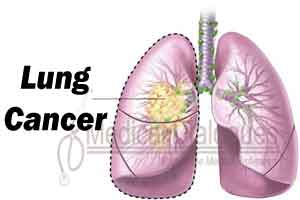- Home
- Editorial
- News
- Practice Guidelines
- Anesthesiology Guidelines
- Cancer Guidelines
- Cardiac Sciences Guidelines
- Critical Care Guidelines
- Dentistry Guidelines
- Dermatology Guidelines
- Diabetes and Endo Guidelines
- Diagnostics Guidelines
- ENT Guidelines
- Featured Practice Guidelines
- Gastroenterology Guidelines
- Geriatrics Guidelines
- Medicine Guidelines
- Nephrology Guidelines
- Neurosciences Guidelines
- Obs and Gynae Guidelines
- Ophthalmology Guidelines
- Orthopaedics Guidelines
- Paediatrics Guidelines
- Psychiatry Guidelines
- Pulmonology Guidelines
- Radiology Guidelines
- Surgery Guidelines
- Urology Guidelines
Proton therapy offers hope for patients with recurrent lung cancer

Washington: An advanced form of image-guided radiation therapy, known as intensity modulated proton therapy (IMPT), has shown early promise for the treatment of recurrent lung cancer.
The new research from The University of Texas MD Anderson Cancer Center found that after reirradiation with IMPT, the majority of patients were free from local recurrence one year following treatment and few experienced severe side effects.
The data is the first to analyze reirradiation of thoracic cancers with IMPT and offers hope for a patient population with few curative treatment options.
As many recurrent lung cancer patients are not candidates for surgery and response rates to second-line chemotherapy are poor, there's been growing interest in the repeat use of radiation, explained lead author Jennifer Ho.
"Historically, repeat radiation at a higher, curative dose was not possible with older, less precise radiation techniques because the cumulative radiation dose necessary to treat the cancer would cause too much toxicity," said Ho.
She added, "In lung cancer, tumours are close to the esophagus, aorta and spinal cord, and all of these critical structures are vital for the body to function. The proton beam - and pencil beam in particular -- provides much more conformal radiation, which means higher doses to tumours and lower dosages to critical structures nearby."
IMPT, one of the most advanced forms of proton therapy, is based on scanning beam technology that can simultaneously optimize intensities and energies of all pencil beams to deliver a precise dose of protons to tumours, explained corresponding author Joe Y. Chang.
The study has been presented at the 2017 Multidisciplinary Thoracic Cancers Symposium.

Disclaimer: This site is primarily intended for healthcare professionals. Any content/information on this website does not replace the advice of medical and/or health professionals and should not be construed as medical/diagnostic advice/endorsement or prescription. Use of this site is subject to our terms of use, privacy policy, advertisement policy. © 2020 Minerva Medical Treatment Pvt Ltd